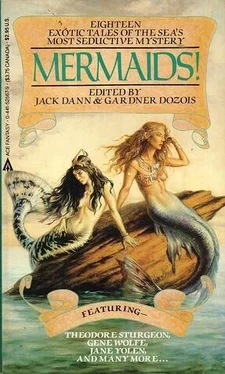Гарднер Дозуа - Mermaids!
Здесь есть возможность читать онлайн «Гарднер Дозуа - Mermaids!» весь текст электронной книги совершенно бесплатно (целиком полную версию без сокращений). В некоторых случаях можно слушать аудио, скачать через торрент в формате fb2 и присутствует краткое содержание. Год выпуска: 1986, ISBN: 1986, Издательство: Ace, Жанр: Фантастика и фэнтези, на английском языке. Описание произведения, (предисловие) а так же отзывы посетителей доступны на портале библиотеки ЛибКат.
- Название:Mermaids!
- Автор:
- Издательство:Ace
- Жанр:
- Год:1986
- ISBN:0-441-52567-9
- Рейтинг книги:5 / 5. Голосов: 1
-
Избранное:Добавить в избранное
- Отзывы:
-
Ваша оценка:
- 100
- 1
- 2
- 3
- 4
- 5
Mermaids!: краткое содержание, описание и аннотация
Предлагаем к чтению аннотацию, описание, краткое содержание или предисловие (зависит от того, что написал сам автор книги «Mermaids!»). Если вы не нашли необходимую информацию о книге — напишите в комментариях, мы постараемся отыскать её.
Mermaids! — читать онлайн бесплатно полную книгу (весь текст) целиком
Ниже представлен текст книги, разбитый по страницам. Система сохранения места последней прочитанной страницы, позволяет с удобством читать онлайн бесплатно книгу «Mermaids!», без необходимости каждый раз заново искать на чём Вы остановились. Поставьте закладку, и сможете в любой момент перейти на страницу, на которой закончили чтение.
Интервал:
Закладка:
The examples of Wild Wise Man listed by Linnaeus were nine, and ranged from Juv. ursinus Lithuania [The Lithuanian bear-boy] 1661 to Johannes Leodicensis [Jean of Liège, "a poor case," says Zingg; no date give.] Perhaps the one most germane to us is that of the Puella Campanica [The Girl of Champagne] 1731—but all had in common that they had been found in woods and wildernesses in a state considered wild, brutish, and other than normally human: Did they represent another order of mankind, a sort of modern Neanderthal? No, of course they didn't; we know better than that , you dumb Squarehead! (We also know how to make lots more things which will kill us than Linnaeus did—and we go right on making them, too; don't we? Yes we do.) All these Wild Boys and Wild Girls, then, represented the then-equivalent of the Sasquatch, Yeti, and Bigfoot, with the addition of being found : quite an addition.
Puella Campanica. She came in from the woods to a village (Songi) in Champagne, in France, at dusk, one September day in 1701. Zingg writes, "As instances of the other pole of idiocy, dementia ex separatione , of those whose mental functions remain intact or able to develop despite the influence of long-continued isolation, Rauber cites the wild-girl of Songi." So will I.
... a girl of nine or ten years ... Her feet were naked, her body was covered with rags and skins of animals, [....] She carried a club ... she saw a [raw] fowl... and began immediately to eat it. She strangled a little rabbit... and ate it... her thumbs were very large ... the result of climbing trees ... swinging from one tree to another... She was just as agile in diving and catching fish ... swimming and diving... Even after two years after her capture she still had not lost the tendency to jump into water to catch fish. In this manner she once escaped from the Castle of Songi through an open door which led to a pond. She jumped into it completely dressed, swam through it and landed on a small island....
Later, after she had been taught to speak French, she told the good people at the convent which housed her that " She.., believed that she preserved a ... memory of the sea or a river and a large water-animal. "
I have no hesitation in saying that in an earlier age she would have been declared a mermaid, tail or no tail. There are one or two things about her which I find rather humanly endearing: " She liked macaroons, and gin, which she called 'burn-stomach.' " For reasons apparent if one reads her story carefully and in full, I believe that Puella Campanica was a bit of a faker, just a bit; but what the hell. An abandoned child, life handed her a lemon. And she made lemonade. I would a lot rather have macaroons and gin than raw frogs any day, Jean Jacques Rousseau, even if you wouldn't—"Burn-stomach!" Whoopee!
As for the once-famous Peter the Wild Boy of Hanover, Linnaeus' Juv. Hannoveranus 1724 , who became and remained a favorite of Royalty for almost forty years, mostly in England—alas for all theories that he was a sort of junior grade Noble Savage, hatched from an acorn or something—the evidence subsequently discovered seems to prove rather plainly that Wild Peter was (a) severely tongue-tied, (b) severely retarded, and (c) driven from home by his peasant-father and stepmother, figures straight out of the fairy tales of their countryman, Grimm. Sailors had seen at different times a naked child on the banks of the river .. . But go read it. What kept poor speechless Peterkin alive was a pension from George II of England and Hanover: The only nice thing I have ever heard about that sullen, hard-bitten, red-faced little monarch (to his Queen, on her deathbed: "I won't marry again. I'll just have mistresses.").. . Sehst, Peterchen, 's'is' geworen besser bei uns in England....
Notice, though, once again, the two items, Noticed near the water , and Could not talk . Am I really the first person to have noticed all this?
Well. So. Notice some more. Here is Wild Peter, "when he particularly liked anything [given him to eat, as green beans, etc.], he indicated his satisfaction by striking repeatedly on his chest . " And the official deposition made in Scotland on October 29, 1811, of the mermaid on the rock, which " was constantly stroking and washing its breast... "—how that is echoed by the other deposition made in Scotland, on November 2nd of the same year, about a "creature" which was " constantly rubbing or wishing its breast with one hand... " Notice this gesture. And let us go back to one of the Juvenes ursini Lithuani 1657 cited by Linnaeus. Writes a contemporary, "... in the woods of Lithuania a boy was found among bears and captured ... With much care he was taught to go erect, but... the voice was lacking ... He could not be taught to make the sign of the cross. He reached his hand to me that I should make the sign of the cross on his breast. "
Had someone once tried to teach Wild Peter to "make the sign of the cross on his breast" before eating?—a gesture (particularly if ill-done) likely not to have been understood in Protestant England? Was that what the unidentified "creatures" in Scotland were doing?... or attempting? Was that what the Lithuanian bear-boy really wanted done? Have these four habits really anything in common? If so, what? What can it mean? Does it mean anything? I wish I knew. I wish I knew.
The so-called Wild Men or Wild Children may or may not have anything to do with mermaids; I think they may, but I leave the matter loose. That any of them may at any time have actually lived with animals I do not insist; the matter is still much disputed. That some of them were children in a state of severe mental retardation seems beyond dispute. What remains uncertain is this: of those who were so afflicted, were all so from their birth, or were not anyway some of them "retarded" as a result of what old Rauber termed dementia ex separatione ... demented as a result of having been separated... separated, that is, from other human company? Rauber was a pioneer psychologist in the early 19th century: but everything learned since substantiates that children raised in isolation suffer severe mental damage ... sometimes irreparable damage: regardless of whether they had been isolated from a human home and lived in the woods for long, or if they had been isolated at home. "The idiot kept in the closet" is, alas, alas, by no means a thing of the past. And, even worse, the child "in the closet" has not always been an idiot; sometimes the child has been illegitimate; sometimes the isolating parent or parents have been themselves mentally unstable.
To carry the matter further lies beyond my space and scope.
Now we come to, or come back to, that more-than-man-sized (and -woman-sized) mammal, the sea cow, so often said—along with, or instead of, the seal—to be the real origin of the mermaid myth. If the story of the mermaid had an origin in the manatee, how are we to account for these so-called sightings in places where there were no manatees; and if they were inspired by seals, how to account for the sightings in places where there were no seals? Or how to account for them where seals were too well-known? Some, no doubt—say, even, certainly—had their origins in the minds of alleged witnesses whose imaginations had been stirred by already-existent stories, of whatsoever origin. Others, it seemed to me, did not ... at least, not entirely. I believe that in days gone by, any naked and shipwrecked person washed ashore in an insular or isolated region where his or her language was not known was likely to be assumed to be a mermaid, a merman, or a sea-monster of some sort and not alone in Europe. There is a record from the East Indies (now Indonesia) from the 1500's, of the finding of "a great white sea-ape." This creature was prudently chained to a wall in the local king's garden, and stayed chained there until it died. We are entitled to disbelieve that it was really "a great white sea-ape," not only because there are no such things, but because on the wall to which it was chained it left graffiti in several languages including Latin and Dutch. In other words, it was a human being, of a race strange to the natives, speaking languages equally strange—and, as it lived chained up there for 34 years, one must only hope that it was at least a very long chain.—This finding has not that I know of ever been applied to the mermaid legend. But I think it very worthy of such application.
Читать дальшеИнтервал:
Закладка:
Похожие книги на «Mermaids!»
Представляем Вашему вниманию похожие книги на «Mermaids!» списком для выбора. Мы отобрали схожую по названию и смыслу литературу в надежде предоставить читателям больше вариантов отыскать новые, интересные, ещё непрочитанные произведения.
Обсуждение, отзывы о книге «Mermaids!» и просто собственные мнения читателей. Оставьте ваши комментарии, напишите, что Вы думаете о произведении, его смысле или главных героях. Укажите что конкретно понравилось, а что нет, и почему Вы так считаете.











![Гарднер Дозуа - Книга Мечей (сборник) [litres с оптимизированной обложкой]](/books/427839/gardner-dozua-kniga-mechej-sbornik-litres-s-opti-thumb.webp)